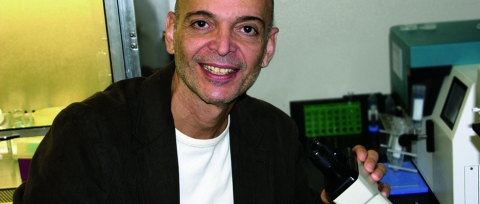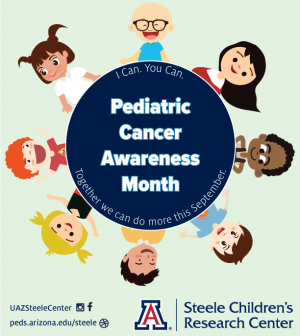Pediatric Hematology / Oncology / HCTT

At UArizona Steele Children’s Research Center, our physician-scientists and researchers are passionately dedicated to improving children’s health.
Our amazing team is the only pediatric cancer research and clinical care in Southern Arizona.
Together we can do more!
Integrated research in the Pediatric Hematology / Oncology / HCTT lab has led to better care of our pediatric cancer patients.
Haploidentical Transplant Trial – Katsanis Lab
Bone marrow transplants (BMT) can cure blood cancers such as leukemias and lymphomas. While bone marrow registries have diversified and expanded, finding a matched unrelated donor has continued to be a challenge especially for minority populations. Haploidentical-BMT (haplo-BMT) provides an alternative source of stem cells for patients who need a bone marrow transplant but are unable to find a perfect or near-perfect unrelated donor match. Haplo-BMT allows for a family donor to be only half a match which can be lifesaving for the many patients needing a BMT. This approach has made BMT possible for almost any patient with a blood cancer who needs one.
The most commonly used protocols begin with chemotherapy, followed by the transplant from the half-matched (haplo) donor. After the transplant, a patient is given more chemotherapy with the drug cyclophosphamide to remove reactive T-cells but leave the patient stem cells and non-reactive T-cells to fight the cancer and viral infections. This current standard treatment with post-transplant cyclophosphamide (PT-CY) is effective, however, it can also suppress some donor T-cells from attacking the leukemia or lymphoma which may result in relapse. We hypothesized that another drug called bendamustine may work similarly but better than cyclophosphamide. Our now published research in mice showed that post-transplant bendamustine (PT-BEN) allowed better donor T activity against their leukemia and therefore less relapses.
Based on those findings, we started a Phase I trial to test our hypothesis that PT-BEN after haplo-BMT in humans may be better than PT-CY. The preliminary results of our trial, which we just published, showed that PT-BEN is well-tolerated, with potential advantages in patients. These advantages included earlier recovery of white blood cell counts and platelets, and less viral infections, such as from cytomegalovirus (CMV).
As our trial continues, PT-BEN progressively replaces PT-CY with the belief that PT-BEN will prove to be a better alternative to PT-CY. We think that PT-BEN will have beneficial effects on the regenerating patient immune system allowing it to better fight infections and kill cancer cells that have survived transplant. Our proposed research will improve our understanding of how PT-BEN works to improve patient outcomes. If confirmed to be more effective, PT-BEN can also be applied to other types of bone marrow transplants such as those using unrelated donors.
Stokes J, Hoffman EA, Zeng Y, Larmonier N, Katsanis E.. Post-transplant bendamustine reduces graft versus host disease while preserving graft versus leukemia in experimental haploidentical bone marrow transplantation. Br J Haematol 2016 Jul;174(1):102-16. Epub 2016/04/01. doi: 10.1111/bjh.14034. PubMed PMID: 27030315; PMCID: PMC4917459
Katsanis E, Sapp LN, Varner N, Koza S, Stea B, Zeng Y. Haploidentical bone marrow transplantation with post-transplant cyclophosphamide/bendamustine in pediatric and young adult patients with hematologic malignancies. Biol Blood Marrow Transplant 2018 Oct;24(10):2034-2039. Epub 2018/06/17. doi: 10.1016/j.bbmt.2018.06.007. PubMed PMID: 29908231
Stokes J, Hoffman EA, Molina MS, Eremija J, Larmonier N, Zeng Y, Katsanis E. Bendamustine with total body irradiation limits murine graft versus host disease in part through effects on myeloid derived suppressor cells. Biol Blood Marrow Transplant 2019 Mar;25(3):405-416. Epub 2018/10/17. doi: 10.1016/j.bbmt.2018.10.009. PubMed PMID: 30326280
Stokes J, Hoffman EA, Molina MS, Kummet N, Simpson RJ, Zeng Y, Katsanis E. Bendamustine with total body irradiation conditioning yields tolerant T-cells while preserving T-cell dependent graft-versus-leukemia. Oncoimmunol 2020 Apr 30;9(1):1758011. Epub 2020/05/12. doi: 10.1080/2162402x.2020.1758011. PubMed PMID: 32391190; PMCID: PMC7199810
Complete List of Published Work in MyBibliography:
https://www.ncbi.nlm.nih.gov/myncbi/16qIfzqpnkuQr/bibliography/public/










